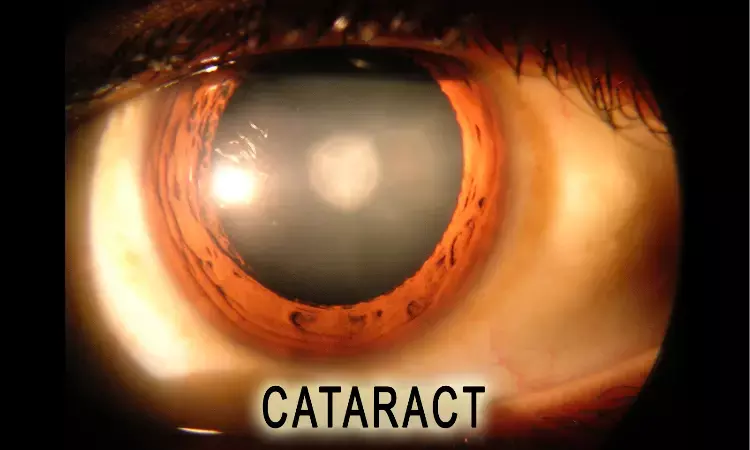- Home
- Medical news & Guidelines
- Anesthesiology
- Cardiology and CTVS
- Critical Care
- Dentistry
- Dermatology
- Diabetes and Endocrinology
- ENT
- Gastroenterology
- Medicine
- Nephrology
- Neurology
- Obstretics-Gynaecology
- Oncology
- Ophthalmology
- Orthopaedics
- Pediatrics-Neonatology
- Psychiatry
- Pulmonology
- Radiology
- Surgery
- Urology
- Laboratory Medicine
- Diet
- Nursing
- Paramedical
- Physiotherapy
- Health news
- Fact Check
- Bone Health Fact Check
- Brain Health Fact Check
- Cancer Related Fact Check
- Child Care Fact Check
- Dental and oral health fact check
- Diabetes and metabolic health fact check
- Diet and Nutrition Fact Check
- Eye and ENT Care Fact Check
- Fitness fact check
- Gut health fact check
- Heart health fact check
- Kidney health fact check
- Medical education fact check
- Men's health fact check
- Respiratory fact check
- Skin and hair care fact check
- Vaccine and Immunization fact check
- Women's health fact check
- AYUSH
- State News
- Andaman and Nicobar Islands
- Andhra Pradesh
- Arunachal Pradesh
- Assam
- Bihar
- Chandigarh
- Chattisgarh
- Dadra and Nagar Haveli
- Daman and Diu
- Delhi
- Goa
- Gujarat
- Haryana
- Himachal Pradesh
- Jammu & Kashmir
- Jharkhand
- Karnataka
- Kerala
- Ladakh
- Lakshadweep
- Madhya Pradesh
- Maharashtra
- Manipur
- Meghalaya
- Mizoram
- Nagaland
- Odisha
- Puducherry
- Punjab
- Rajasthan
- Sikkim
- Tamil Nadu
- Telangana
- Tripura
- Uttar Pradesh
- Uttrakhand
- West Bengal
- Medical Education
- Industry
Systemic drugs closely associated with cataract development

An updated research that was released in the American Journal of Ophthalmology sheds fresh light on the intricate connections between systemic drugs and cataract surgery.
Cataract is a serious health issue in the aging population that is linked to decreased quality of life, worsened mental and visual acuity, higher mortality, and a significant financial burden on society. There is growing evidence that systemic drugs and cataract are closely related. It has long been known that using corticosteroids increases the chance of developing cataracts. Therefore, to thoroughly examine relationships between systemic medication exposures and surgically treated cataract, Ruidong Deng and team have opted to use the National Health and Nutrition Examination Survey (NHANES) dataset.
Participants under the age of 40 from the National Health and Nutrition Examination Survey conducted between 1999 and 2008 were included in this retrospective cross-sectional analysis. A cataract requiring surgery was described as one that had undergone surgery. Home interviews were used to get data on recent prescription medication usage. The study excluded drug classes with ocular indications and those prescribed to fewer than 0.5% of individuals. To investigate relationships between each medication category and surgically treated cataracts, several logistic regression models were applied.
The key findings of this study were:
1. The present analysis comprised a total of 14,931. 9.6% of cataracts were surgically corrected on a weighted basis (n=2010).
2. After further adjusting for relevant comorbidities, we found 20 medication categories that showed a significant connection with surgically treated cataract, of which eight correlations remained statistically significant.
3. The tricyclic antidepressants, insulin, and group III antiarrhythmic medicines were the three drug groups with the greatest OR values.
4. In women, the usage of sex hormone combinations decreased the likelihood of cataract surgery. All eight medication categories showed dose-response associations.
This study found a strong correlation between the use of minerals and electrolytes, insulin, tricyclic antidepressants, SSRIs, calcium channel blockers, loop diuretics, and class III antiarrhythmics, as well as insulin usage and cataract. Combinations of sex hormones have also been found to have a protective effect. These discoveries may aid in the future development of more efficient cataract preventive and treatment strategies by offering important new insights into the biological processes behind the onset and development of cataract. In order to corroborate our findings, more research is required because of the exploratory character of our investigation.
Reference:
Deng, R., Zhu, Z., Han, X., Shang, X., He, M., Xu, G., Chen, Z., & Fan, H. (2023). Evaluation of Systemic Medications Associated with Surgically Treated Cataract among US Adults. In American Journal of Ophthalmology. Elsevier BV. https://doi.org/10.1016/j.ajo.2023.01.005
Neuroscience Masters graduate
Jacinthlyn Sylvia, a Neuroscience Master's graduate from Chennai has worked extensively in deciphering the neurobiology of cognition and motor control in aging. She also has spread-out exposure to Neurosurgery from her Bachelor’s. She is currently involved in active Neuro-Oncology research. She is an upcoming neuroscientist with a fiery passion for writing. Her news cover at Medical Dialogues feature recent discoveries and updates from the healthcare and biomedical research fields. She can be reached at editorial@medicaldialogues.in
Dr Kamal Kant Kohli-MBBS, DTCD- a chest specialist with more than 30 years of practice and a flair for writing clinical articles, Dr Kamal Kant Kohli joined Medical Dialogues as a Chief Editor of Medical News. Besides writing articles, as an editor, he proofreads and verifies all the medical content published on Medical Dialogues including those coming from journals, studies,medical conferences,guidelines etc. Email: drkohli@medicaldialogues.in. Contact no. 011-43720751


